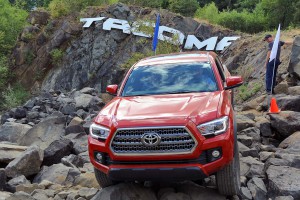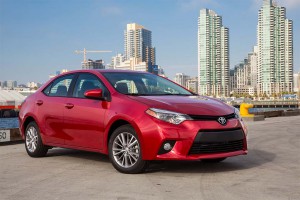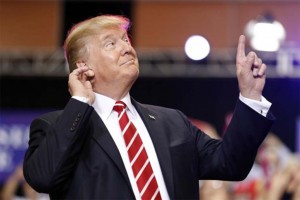Toyota is scaling back by nearly a third its investment in a new plant in Mexico that will build some of its compact Tacoma pickup trucks, the Japanese automaker has confirmed.
The factory was originally set to cost $1 billion, a figure that will now be scaled back to $700 million. Production of Toyota’s Corolla sedan, which also was to go into the plant in Guanajuato, will now be moved to a new factory Toyota is setting up in the U.S.
The decision comes at a time when President Donald Trump has been leaning hard on automakers to boost U.S. production and, in particular, move operations out of Mexico. But several Toyota executives stressed that the shift in production was not motivated by political pressure.
“We are not playing any political game, to please anybody,” Executive Vice President Didier Leroy told reporters at the Tokyo Motor Show. “We are just doing what is the best for the company.”
(Automakers launch big campaign to save NAFTA. Click Here for the story.)
Toyota Initially saw the Mexican plant as a facility where it could build two of its higher-volume models, the Tacoma pickup and the Corolla sedan. But since the originally $1 billion project was announced several factors have come into play.
For one thing, the U.S. market has seen a significant shift away from sedans and coupes in favor of SUVs, pickups and other light trucks. That favors retaining a plant to boost capacity for the Tacoma, especially as the compact pickup market starts to rebound after years of decline.
But demand for the Corolla, like the bigger Camry, has been hit hard by the car to truck transformation. So, Toyota is now factoring what will likely be lower volumes for the Corolla into an all-new U.S. plant it announced over the summer. That factory is also set to produce a new line of electric vehicles expected to use a new type of technology called solid-state batteries.
Toyota has not yet revealed full details for the new American factory, which will be operated as a joint venture with smaller Japanese maker Mazda. That includes the location of the plant. A number of U.S. states are now bidding for the project.
(For more on that project, Click Here.)
Despite Toyota’s affirmation that the plant realignment was not politically motivated, Trump has claimed it as a victory for his campaign to bring back American manufacturing jobs. He has been pressing the auto industry to increase U.S. production since early in his campaign for the White House, and Toyota was one of the manufacturers he directly attacked for plans to build vehicles in Mexico.
He also took aim at Ford Motor Co., warning it could face “big” tariffs if it went ahead with plans to move its small car production to a new plant in Mexico. Ford announced in January it was canceling plants for that factory, but Executive Vice President Joe Hinrichs told TheDetroitBureau.com that the move was the result of declining demand for passenger cars like its Focus model, and not the result of political pressure.
At the time, Ford said small car production would still move to Mexico – but it subsequently decided to consolidate production of the Focus in China. It will soon become one of a handful of vehicles exported from China to the U.S.
(Click Here to check out the GR HV and other new models and concepts Toyota is showing off at this week’s Tokyo Motor Show.)
While a handful of small parts operations have been moved to the U.S. from Mexico this year, the auto industry continues to invest heavily in operations South of the Border. That reflects several factors, according to industry analysts, including the low cost of Mexican labor.
Another draw is the fact that Mexico has negotiated more free trade agreements than any other country but Israel, making it an ideal global export base.
Automakers have been warning that the Trump Administration’s ongoing efforts to restrict free trade – especially the threat of scrubbing the NAFTA agreement – could actually backfire by making it more difficult to use the U.S. as a production and export base.



